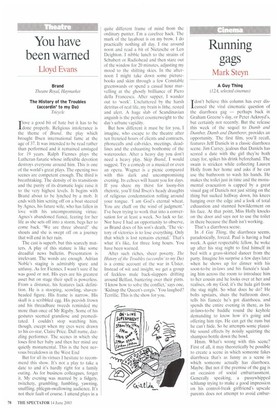You have been warned
Lloyd Evans
Brand Theatre Royal. Haymarket The History of the Troubles (accordire to my Da) :tricycle
Ilove a good bit of hate but it has to be done properly. Religious intolerance is the theme of Brand, the play which brought Ibsen international fame at the acre of 37. It was intended to be read rather than performed and it remained unstaged for 19 years. Ralph Fiennes plays the Lutheran fanatic whose inflexible devotion destroys everyone around him. This is one of the world's great plays. The opening two scenes are competent enough. The third is breathtaking. The density of its transitions and the purity of its dramatic logic raise it to the very highest levels. It begins with Brand about to be lynched by a mob. It ends with him setting off on a boat steered by Agnes, his future wife, who has fallen in love with his uncompromising virtue. Agnes's abandoned fiancé, fearing for her life as she sets off into a storm, begs her to come hack. 'We are three aboard!' she shouts and she is swept off on a journey that will end in her ruin.
The cast is superb, but this scarcely matters. A play of this stature is like some dreadful news bulletin. Presentation is irrelevant. The words are enough. Adrian Noble's staging is admirably spare and unfussy. As for Fiennes, I wasn't sure if he was good or not. His eyes are his greatest asset but on stage their spell is powerless. From a distance, his features lack definition. He is a stooping, scowling, shavenheaded figure. His frame is narrow. His skull is a scribbled egg. His peevish frown and his threadbare tweeds reminded me more than once of Mr Rigsby. Some of his gestures seemed grandiose and premeditated. I couldn't stop watching him, though, except when my eyes were drawn to his co-star, Claire Price. Dull name, dazzling performer. The scenes in which she loses first her baby and then her mind are quietly monumental. This is the best nervous breakdown in the West End But for all its virtues I hesitate to recommend this show. It's not a play to take a date to and it's hardly right for a family outing. As for business colleagues, forget it. My evening was marred by a fidgety, twitchety, grumbling, fumbling, yawning, snuffling, phlegm-swallowing audience. It's not their fault of course. I attend plays in a quite different frame of mind from the ordinary punter. I'm a carefree hack. The mark of the layabout is on my brow. I do practically nothing all day. I rise around noon and read a bit of Nietzsche or Len Deighton. I nibble lunch to the strains of Schubert or Radiohead and then stare out of the window for 20 minutes, adjusting my mood to the shifting skies. In the afternoon I might take down some picturebooks and skim through a few Constable greenswards or spend a casual hour marvelling at the ghostly brilliance of Piero della Francesca. After supper, I wander out to 'work'. Uncluttered by the harsh detritus of real life, my brain is lithe, rested and alert. A huge slab of Scandinavian anguish is the perfect counterweight to the day's urbane vapidity.
But how different it must be for you, I imagine, who escape to the theatre after ten frenzied hours of clients and contracts, phonecalls and cab-rides, meetings, deadlines and the exhausting bonhomie of the watercooler. After a heavy day you don't need a heavy play. Skip Brand, I would suggest. Try a comedy or a musical or even an opera. Wagner is a picnic compared with this dark and uncompromising evening. Its echoes will haunt you for days. If you share my thirst for loony-bin rhetoric, you'll find Ibsen's heady draughts of religious condemnation rolling around your tongue. 'I am God's eternal wheat. You are chaff on the wind of judgment.' I've been trying to work that into a conversation for at least a week. No luck so far. Nor have I had an opportunity to observe, as Brand does of his son's death, 'The victory of victories is to lose everything. Only that which is lost remains eternal.' That's what it's like, for three long hours. You have been warned.
After such riches, sheer poverty. The Histoty of the Troubles (accordin' to my Da) is a comic account of the war in Ulster. Instead of wit and insight, we get a group of feckless male back-slappers drifting around Belfast, bantering over their pints. 'I know how to solve the conflict,' says one, 'Kidnap the Queen's corgis.' You laughed? Terrific. This is the show for you.


































































































 Previous page
Previous page